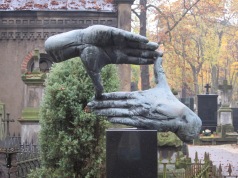• Polish Radio Choir to be liquidated?
Thursday, 1 March 2012 Leave a comment
Chór Polskiego Radia (1948-2012?)
Last November, I joined the Polish Radio Choir in Durham for the start of its UK tour. Yesterday, I learned that, unless Polish Radio relents, the choir is to be liquidated. It’s a strong term, ‘liquidation’, reserved for businesses or the horrors of ethnic cleansing. But it’s the one chosen by Polish Radio to describe its decision about the Kraków-based Radio Choir. Coming on the eve of the 75th anniversary (today) of Polish Radio’s cultural channel PR2 (the equivalent of BBC R3 in the UK), this news could hardly have been more pointed.
There is still an outside chance that the choir will be saved, but it looks like a forlorn hope. The Minister of Culture yesterday reiterated his offer of an annual subsidy of 800,000 zł. It was there on the table before the Polish Radio Management Board took its executive decision last week, but it had no effect. 800,000 zł is a sizeable offer – the equivalent of c.£162,630 – and represents almost 50% of the total annual cost of the choir, £1.7m zł (= c.£345,589). In the larger scheme of things, it’s not a huge sum of money to pay each year for such a world-class ensemble (individual annual salaries must average around £10K). Whether Polish Radio reverses its decision at the meeting of its Supervisory Board on 15 March is anybody’s guess, but the omens do not look good.
Whatever public hand-wringing goes on, whatever platitudes are uttered about painful decisions and whatever regrets expressed (and how hollow such sentiments ring), the fact is simple. Like any organisation that finds itself in financial straits, priorities are made and if an individual or group is not deemed central to future operations, then that’s it. Polish Radio evidently thinks that this outstanding choir is no longer essential, even though it has been a key part of its cultural strategy since the choir was founded in 1948. It has been one of its most distinguished – and economically effective – cultural ambassadors. If Polish Radio had wanted to keep the choir, it could and would have, and some other sector of the organisation would have suffered instead. I’m not in a position to know what elements in Polish Radio’s current programming policy are more central, more essential or more worth saving, but you can bet your bottom złoty that they ain’t going to add quality to its cultural programming.
One of the key elements in any public broadcasting strategy is to provide programming initiatives that are distinctive. In music, that requires ‘house’ orchestras and other ensembles, like specialist choirs. With far fewer commercial pressures than independent orchestras and choirs, these performing bodies are in a position to put on concerts whose repertoire can often, indeed should be more adventurous and wide-ranging. The BBC Singers, whose history dates back almost 90 years to the mid-1920s, are, at 24 singers, fewer in number than their Polish counterparts but fulfil a similar function, with challenging and less frequently performed repertoire at their core. Fortunately, the BBC Singers seem secure in the BBC’s cultural strategy, but if they were ever to come under threat the outcry would be enormous.
Polish Radio, however, has ridden roughshod over the national outcry at its decision. All the major cultural institutions in Poland – including the Ministry of Culture and its generous offer of recurrent subsidy – plus numerous individuals, including senior composers such as Krzysztof Penderecki and Wojciech Kilar, have argued cogently against it, but to no avail. If nothing changes a fortnight today, the choir will be disbanded this summer.
I have a personal reason to be dismayed by this, as I took part (giving pre-concert talks) in the choir’s UK tour last November. They sang at Durham Cathedral, King’s Place in London, St George’s in Bristol and St George’s Hall in Liverpool. They gave wonderfully attuned performances of a cappella pieces by their compatriot Henryk Mikołaj Górecki, who had died just a year earlier. Audiences were mesmerised not just by the music but by the exceptional quality of the choir’s sound. Enthusiastic applause and standing ovations were instinctive responses.
This is a lamentable turn of events, and an unwarranted farewell is on the cards. One last, unexpected memory for me was from the choir’s first night, in Durham Cathedral. They had hardly begun the concert, with Górecki’s peaceful Totus Tuus, when the building seemed to be assaulted by a barrage of explosions as if we were under siege. Not a single singer blinked, no-one looked askance, no voice wavered. They didn’t know it, but it was Bonfire Night. I am sure that they will bear the next few months with similar dignity and sense of musical purpose if the worst comes to the worst.
If you want to write a letter of protest, you can do so by contacting the President of the Polish Radio Supervisory Board, Mr. Stanisław Jędrzejewski (who will chair the board meeting on 15 March), at <marta.rybak@polskieradio.pl>.

